Future-proof Your Marketing with AI: Top Tips and Tools from Marketing Experts
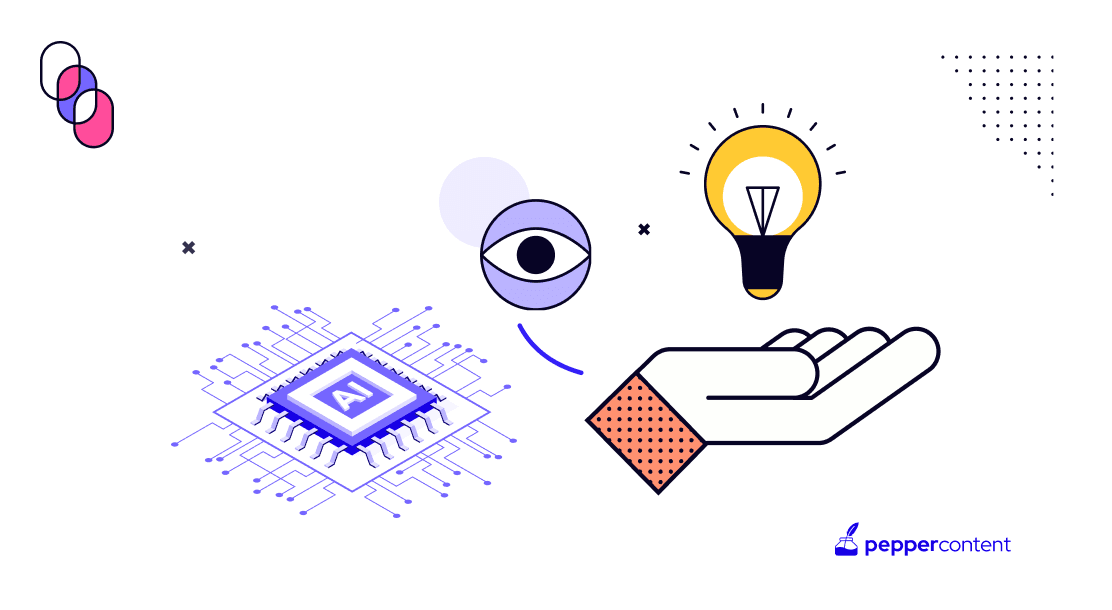
Imagine a world where your marketing strategies predict customer needs even before they do. That’s the reality AI is crafting in 2024. As a marketing professional, you’re always on the lookout for the next big thing. Well, AI is that monumental shift, transforming how we understand and engage with customers. This blog is your front-row ticket to understanding how AI isn’t just enhancing marketing—it’s redefining it.
From pinpoint accuracy in targeting to real-time customer insights, AI is the key to unlocking a treasure trove of opportunities. Today, we’re not just sharing AI marketing tips; we’re unveiling the roadmap to an AI-driven marketing future. Get ready to explore strategies that will not just resonate with your audience but also revolutionize the way you think about marketing.
The Evolution of AI in Marketing
In the ever-evolving landscape of marketing, AI isn’t just a player; it’s becoming the game changer. Think back to 2021, when AI in marketing was a growing field valued at nearly $15.84 billion. Now, fast forward to today. The forecast? An astounding leap to over $107.5 billion by 2028. This isn’t just growth; it’s a revolution.
Take predictive analytics, for instance. It’s like having a crystal ball, giving you insights into customer behaviors and trends before they even happen. This isn’t just about making guesses; it’s about making informed, data-driven decisions that put you miles ahead of the competition.
And then there’s AI-driven content creation. It’s like having a tireless team of creative geniuses at your fingertips, crafting content that resonates with your audience on a deeply personal level. This isn’t just content; it’s connection.
As a marketing professional, understanding these AI applications isn’t just beneficial; it’s essential. You’re not just following trends. You’re setting them. Welcome to the future of marketing, where AI is your ally in crafting strategies that are not only effective but also revolutionary.
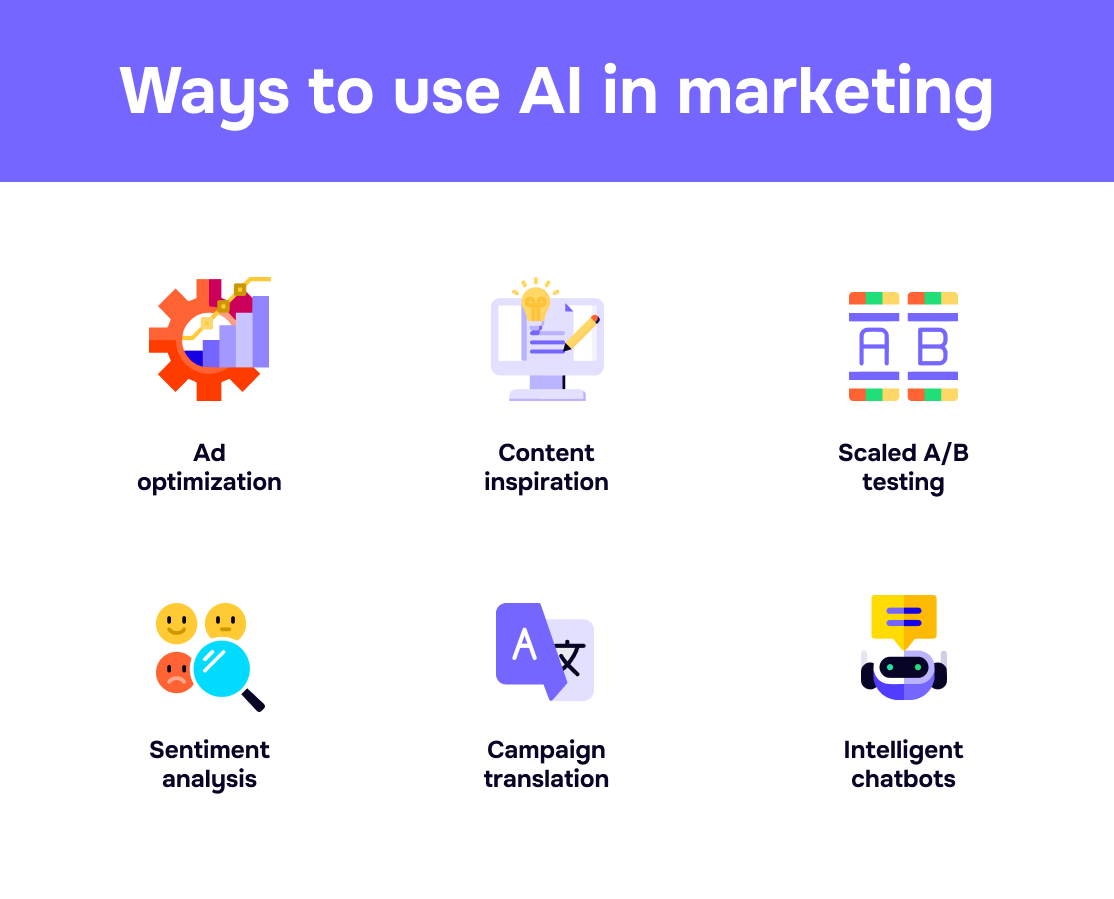
Top 7 AI Tools for Marketing in 2024 (Suggested by Industry Experts)
Step into the future of marketing with our curated list of the Top AI Tools for 2024, where cutting-edge technology meets creativity, transforming how we connect with audiences and revolutionize digital strategies. These tools are not just about embracing innovation; they’re about setting new benchmarks in the ever-evolving landscape of marketing.
1. Jasper.AI
- About: Jasper.AI, evolving from Conversion.ai, leverages OpenAI’s GPT-3 model to craft compelling ad copy, emails, and social media content with a human touch.
- Main functionality: Specializes in generating diverse content types with unique tone settings and plagiarism checks.
- Pricing: $39/month for starter (or creator mode), $59/month for pro (or Boss mode).
- Target users: Ideal for e-commerce businesses and content creators seeking to enhance their digital presence.
- Pros: Offers a range of templates and styles, ensuring versatility in content creation.
- Cons: Limited word count might restrict extensive content needs.
- Real-world relevance: Empowers businesses to rapidly produce high-quality content, enhancing engagement and conversion rates.

2. Beacons AI
- About: Beacons AI simplifies the brand outreach process for creators, making personalized pitch crafting effortless.
- Main functionality: Generates tailored pitch emails with a comprehensive brand database and tone customization.
- Pricing: Free forever (with limited features), $30/month with Marketing Bundle.
- Target users: Best suited for content creators and businesses of all sizes aiming for effective brand collaboration.
- Pros: User-friendly interface with high-quality content output.
- Cons: Primarily focused on email personalization, which may be limiting for broader marketing needs.
- Real-world relevance: Ideal for enhancing brand partnerships and influencer collaborations through personalized communication.
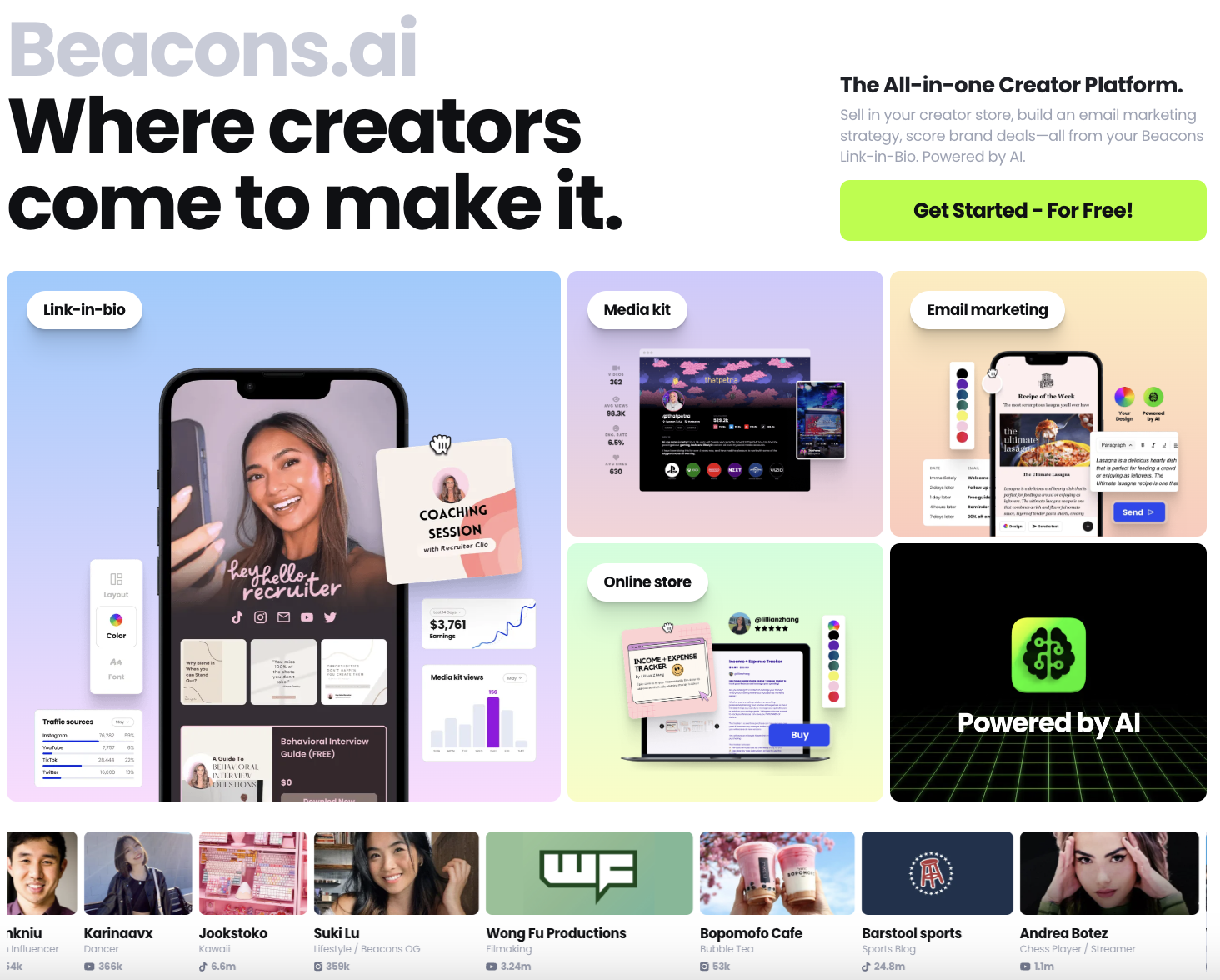
3. Rapidely
- About: Rapidely harnesses GPT-4 technology to transform social media content creation, offering a streamlined, efficient approach.
- Main functionality: Features include collaborative planning, post-scheduling, and innovative content generation tools.
- Pricing: Starts at $29/month.
- Target users: Tailored for small businesses and entrepreneurs seeking to elevate their social media game.
- Pros: Affordable and versatile, with a unique AI hashtag generator.
- Cons: Lacks a calendar-sharing feature, which might be a drawback for team collaboration.
- Real-world relevance: Streamlines content creation and scheduling, boosting social media presence and engagement.
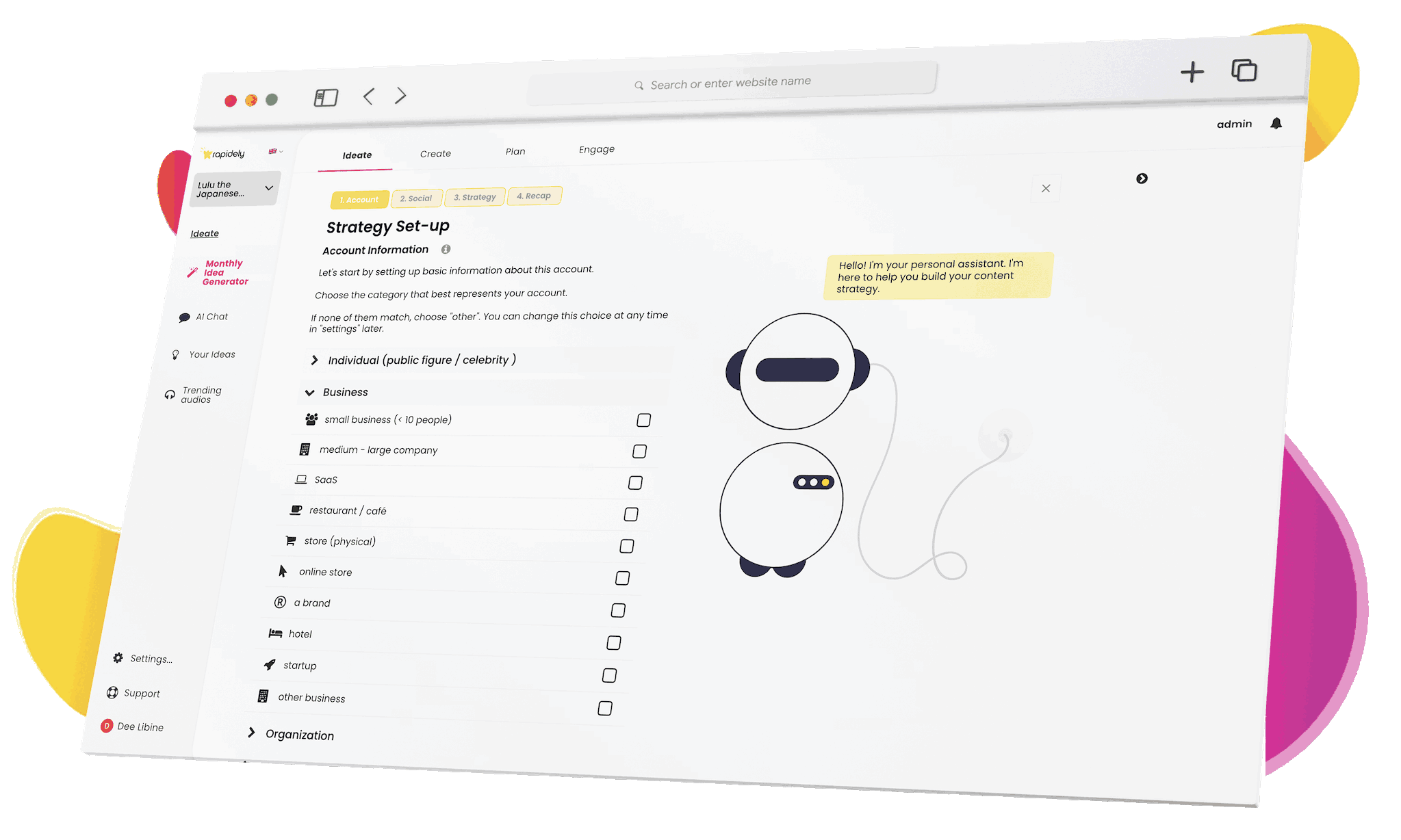
4. Flick AI
- About: Flick AI Social Media Assistant is designed to enhance social media strategy with AI-driven content creation and management.
- Main functionality: Offers AI caption writing, brainstorming tools, and efficient post-scheduling.
- Pricing: Starts at £11/month.
- Target users: Ideal for small businesses looking for creative and organized social media management.
- Pros: Provides endless content ideas and integrates with Flick’s Scheduler for streamlined planning.
- Cons: Some AI features are in beta, which may affect reliability.
- Real-world relevance: Enhances social media strategy with creative content, driving audience engagement.
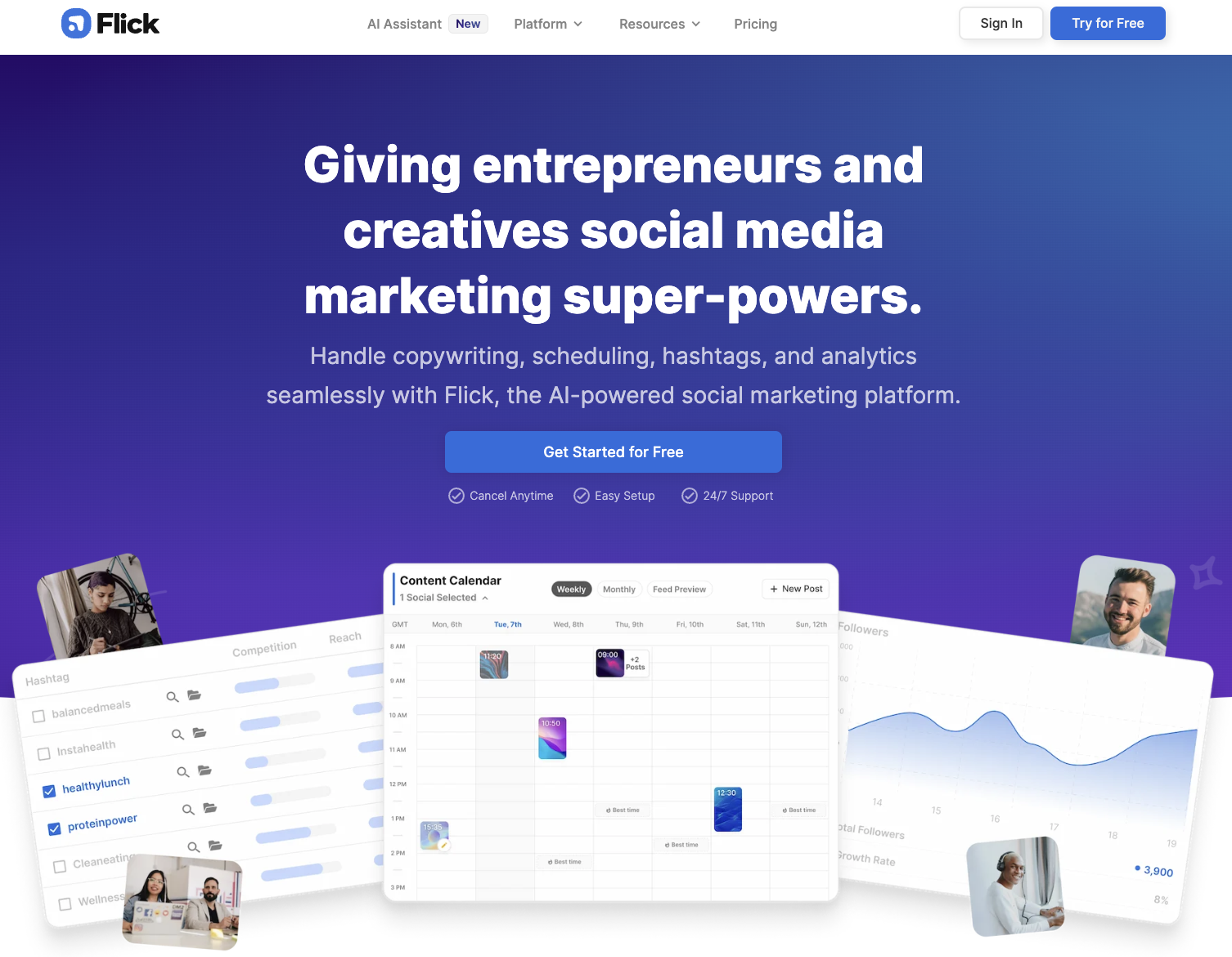
5. DeepBrain AI
- About: DeepBrain AI revolutionizes video content creation, turning text into high-quality videos with realistic AI avatars.
- Main functionality: Features include text-to-video conversion, custom avatars, and efficient subtitle generation.
- Pricing: Starts from $30/month.
- Target users: Suitable for media, retail brands, agencies, and educators seeking innovative video solutions.
- Pros: Quick production time, multilingual support, and diverse application potential.
- Cons: The 10-minute video limit on basic plans and the lack of traditional editing features may be restrictive.
- Real-world relevance: Enables rapid creation of engaging video content for various platforms, enhancing viewer experience.
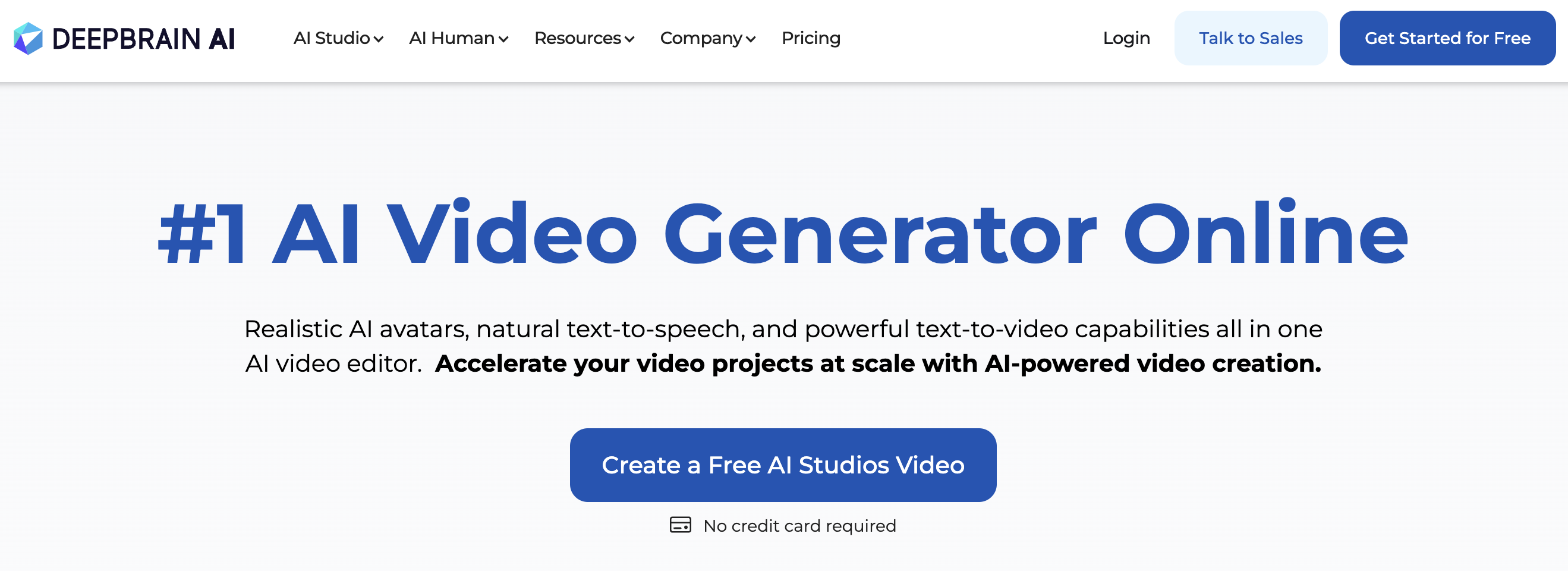
6. Brandwatch
- About: Brandwatch offers deep consumer insights and social media management through its AI-powered platform.
- Main functionality: Specializes in automated reporting, influencer identification, and comprehensive follower analysis.
- Pricing: Custom quote.
- Target users: Designed for businesses of all sizes needing in-depth market and consumer analysis.
- Pros: Provides extensive data analysis and impressive visualization capabilities.
- Cons: The complexity of data and advanced features may require a steep learning curve.
- Real-world relevance: Offers comprehensive market insights for targeted campaigns and enhanced customer engagement.
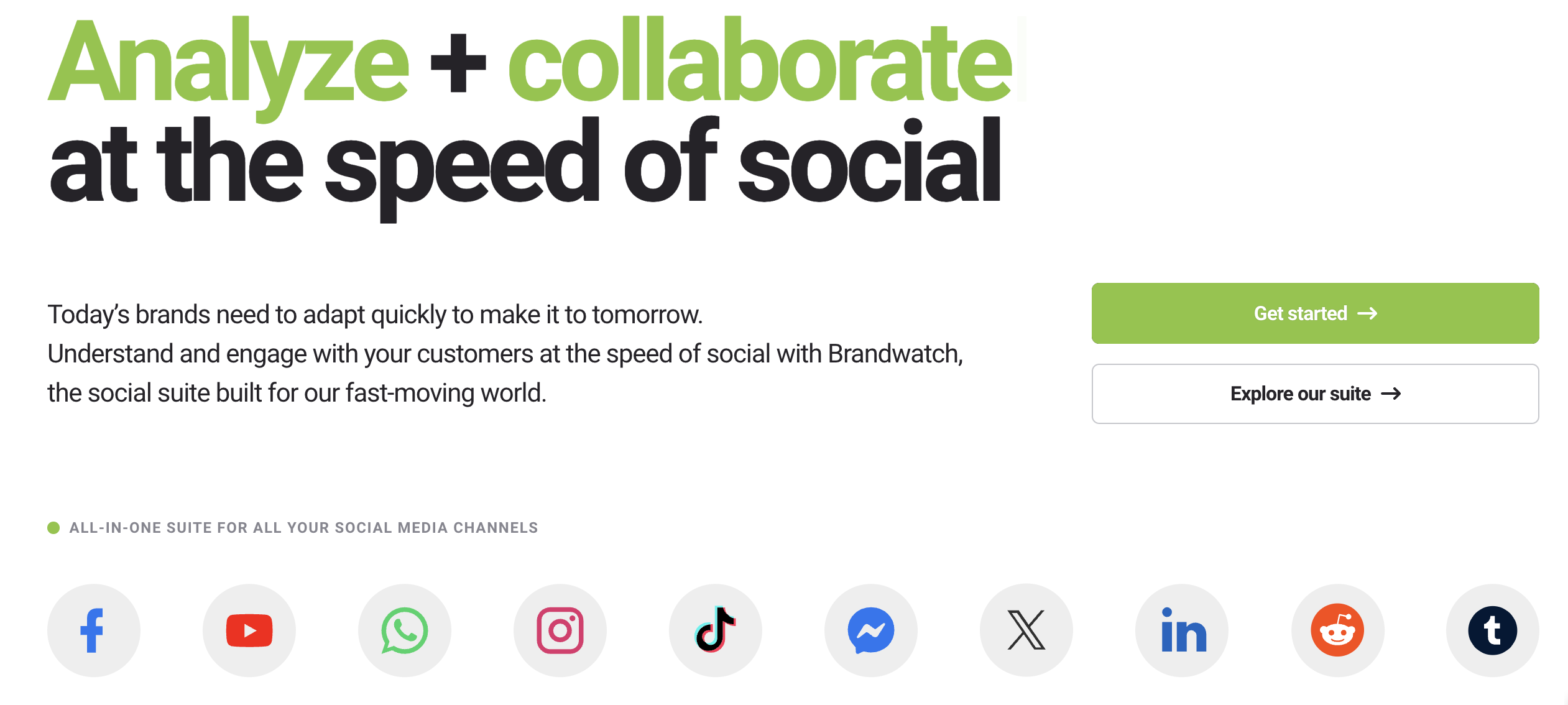
7. Brand24
- About: Brand24 extends beyond traditional social media monitoring, offering a comprehensive view of online brand presence.
- Main functionality: Focuses on sentiment analysis, discussion volume tracking, and effective data exporting.
- Pricing: Starts at $79/month.
- Target users: Suitable for brands and agencies of all sizes looking for holistic media monitoring.
- Pros: Advanced monitoring capabilities with AI-enhanced data interpretation.
- Cons: The platform can be overwhelming with data, and navigation may not be intuitive for all users.
- Real-world relevance: Essential for brands seeking a holistic view of their online reputation and audience sentiment.
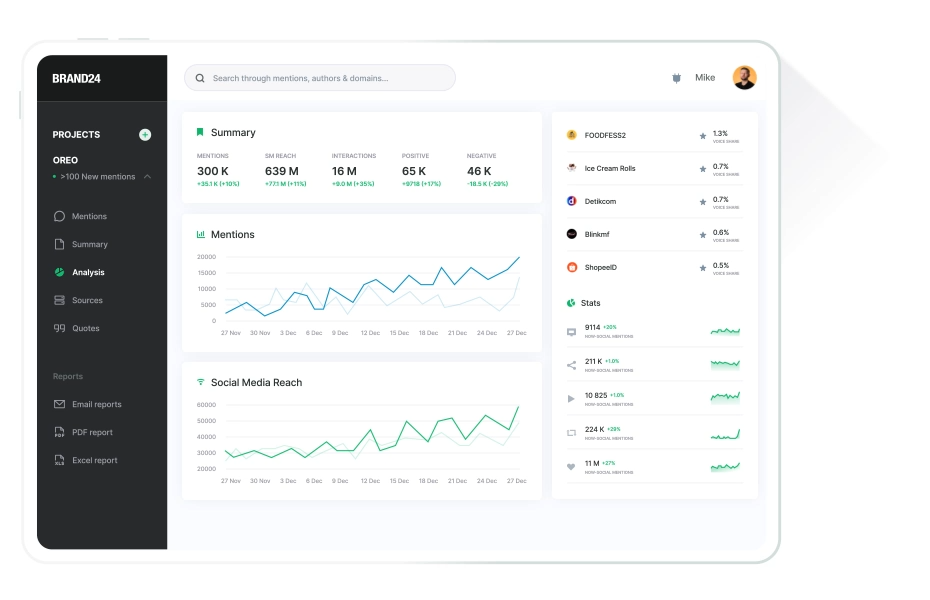
10 Insightful AI Marketing Tips from Industry Leaders (and Their Practical Applications)
In the dynamic world of marketing, AI is rapidly becoming a pivotal tool, reshaping strategies and enhancing customer engagement. Here’s a compilation of insights and tips from industry leaders, focusing on content marketing, SEO, and general marketing, along with practical applications in real-world scenarios.
1. Embracing AI for Targeted Advertising – Tom Kershaw, Magnite
Insight: Kershaw emphasizes the importance of using AI to enhance advertising precision. AI’s strength lies in its ability to analyze vast amounts of consumer data, leading to more accurately targeted advertisements.
Real-world application: A boutique clothing store could use AI to analyze customer purchase patterns and online behavior, creating personalized ad campaigns for each customer segment, resulting in higher engagement and sales.
2. Harnessing AI to Eliminate Biases – Bob Lord, IBM
Insight: Lord suggests using AI to identify and remove biases in marketing data. This approach leads to a more authentic understanding of diverse consumer groups.
Real-world application: A multinational corporation could implement AI to analyze global market trends and customer feedback, ensuring their marketing strategies are culturally sensitive and inclusive, thereby strengthening their global brand presence.
3. Personalization with Privacy – Michael Kassan, MediaLink
Insight: Kassan highlights the delicate balance between personalization and privacy. AI can help create intimate yet respectful interactions with consumers.
Real-world application: An online streaming service could use AI to suggest personalized movie recommendations based on viewing history, while ensuring data privacy, thus enhancing user experience without compromising trust.
4. AI in Programmatic Advertising – Beth Mach, TrueCar, Inc.
Insight: Mach advocates for the use of AI in automating ad-buying processes. This leads to more efficient ad placements and budget optimization.
Real-world application: A small local bakery could use AI to identify the best times and platforms to advertise their special offers, ensuring their ads reach the right audience at the right time, and maximizing their marketing budget.
5. Quick, Data-Driven Decisions – Kirk McDonald, GroupM
Insight: McDonald stresses the importance of using AI for rapid data analysis, enabling marketers to make swift, informed decisions.
Real-world application: A fitness equipment company could use AI to monitor online customer reviews and social media trends, quickly adapting its marketing strategy to highlight its most popular products.
6. AI for Routine Marketing Tasks – Selam Emiru, Glisen
Insight: Emiru suggests using AI to automate routine marketing tasks, allowing teams to focus on creative and strategic efforts.
Real-world application: A digital marketing agency might employ AI for generating SEO-friendly blog posts, freeing up their creative team to develop innovative campaign ideas and strategies.
7. Personalized Customer Experiences – Mu’az Zakariyya, guide media
Insight: Zakariyya points out the power of AI in creating personalized experiences for customers by analyzing individual data.
Real-world application: An online bookstore can use AI to recommend books based on a customer’s previous purchases and browsing history, making each customer’s shopping experience unique and tailored.
8. Hyper-Targeted Campaigns – Maria Harutyunyan, Loopex Digital
Insight: Harutyunyan emphasizes the use of AI in crafting highly specific marketing campaigns based on detailed customer data.
Real-world application: A mobile app development company could use AI to send targeted email campaigns to app developers, offering them tools and resources specific to their recent project types.
9. Impactful Marketing Strategies – Guna Kakulapati, Cureskin
Insight: Kakulapati highlights how AI can lead to more effective marketing by analyzing customer behavior and preferences.
Real-world application: A skincare brand can analyze customer feedback and skin type data using AI, creating targeted marketing campaigns for products that cater to specific skin concerns.
10. Content Creation and Market Insights – Maha Shahidi, Rizvan
Insight: Shahidi discusses how AI can be instrumental in content creation and providing market insights, saving time, and offering fresh perspectives.
Real-world application: A startup in the sustainable energy sector might use AI to generate engaging content on social media about renewable energy trends, positioning themselves as thought leaders in the industry.
These insights from industry leaders reveal the depth and versatility of AI in marketing. By applying these tips in real-world scenarios, you can not only enhance your marketing strategies but also forge stronger, more meaningful connections with your audiences. The key is to blend AI’s analytical capabilities with a deep understanding of customer needs and market dynamics.
AI Marketing Trends to Watch in 2024
As we step into 2024, the landscape of AI in marketing continues to evolve at a breathtaking pace. Marketers are increasingly leveraging AI-driven technologies to create more personalized, efficient, and innovative strategies. From predictive analytics to conversational AI, these emerging trends are setting new benchmarks in customer engagement and business growth.
1. Predictive Analytics
This technology sifts through massive data to predict customer behaviors, from purchasing trends to campaign timing. Its ability to process complex variables offers invaluable insights for market forecasting and consumer behavior shifts.
Impact on your marketing strategies:
- Personalized marketing: Enables brands to cater to individual preferences, boosting engagement and loyalty.
- Resource allocation: Allows for effective marketing resource distribution.
- Customer experience: Anticipates needs for a smoother customer journey.
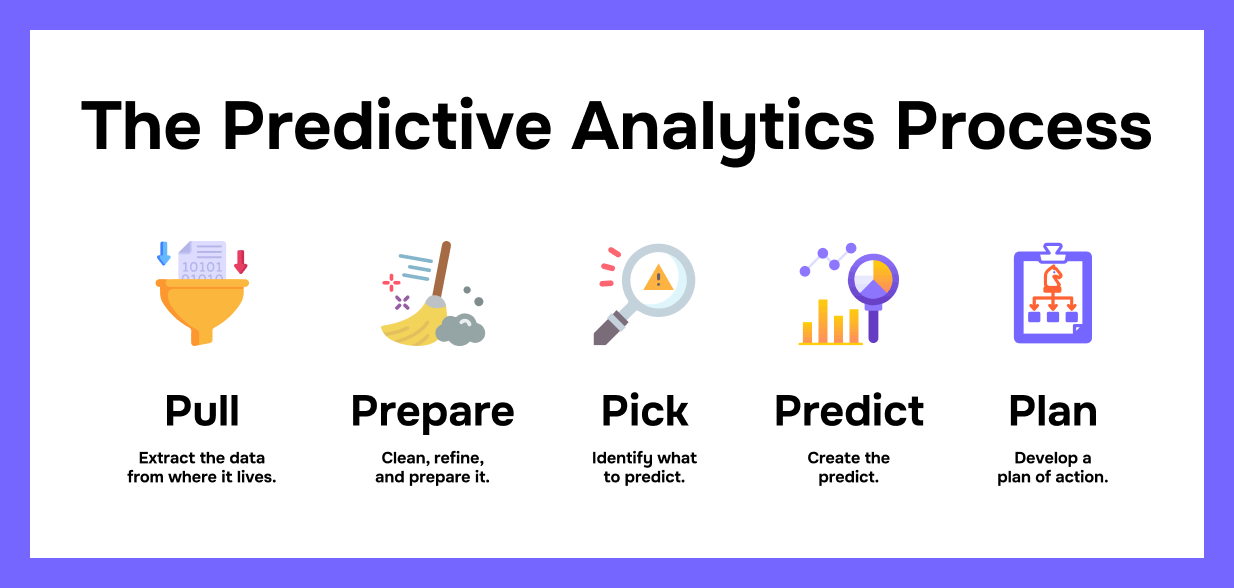
2. Conversational AI
Evolving beyond scripted responses, this technology now offers sophisticated, context-aware interactions through chatbots and voice assistants. Its advancements in natural language processing (NLP) make it a reliable tool for customer service and conversational commerce.
Impact on your marketing strategies:
- Customer service: Provides immediate, personalized responses, enhancing satisfaction.
- Engagement: Engages customers in real-time, boosting interaction rates.
- Data insights: Gathers valuable customer preferences and behavior data.
3. Generative AI (GenAI)
At the cutting edge of content creation, GenAI produces everything from articles to synthetic media. It’s reshaping marketing by enabling rapid, customized content creation and new product design ideas.
Impact on your marketing strategies:
- Content creation: Streamlines the creation of high-quality content.
- Personalization: Generates audience-specific content at scale.
- Campaign innovation: Offers creative and unique campaign possibilities.
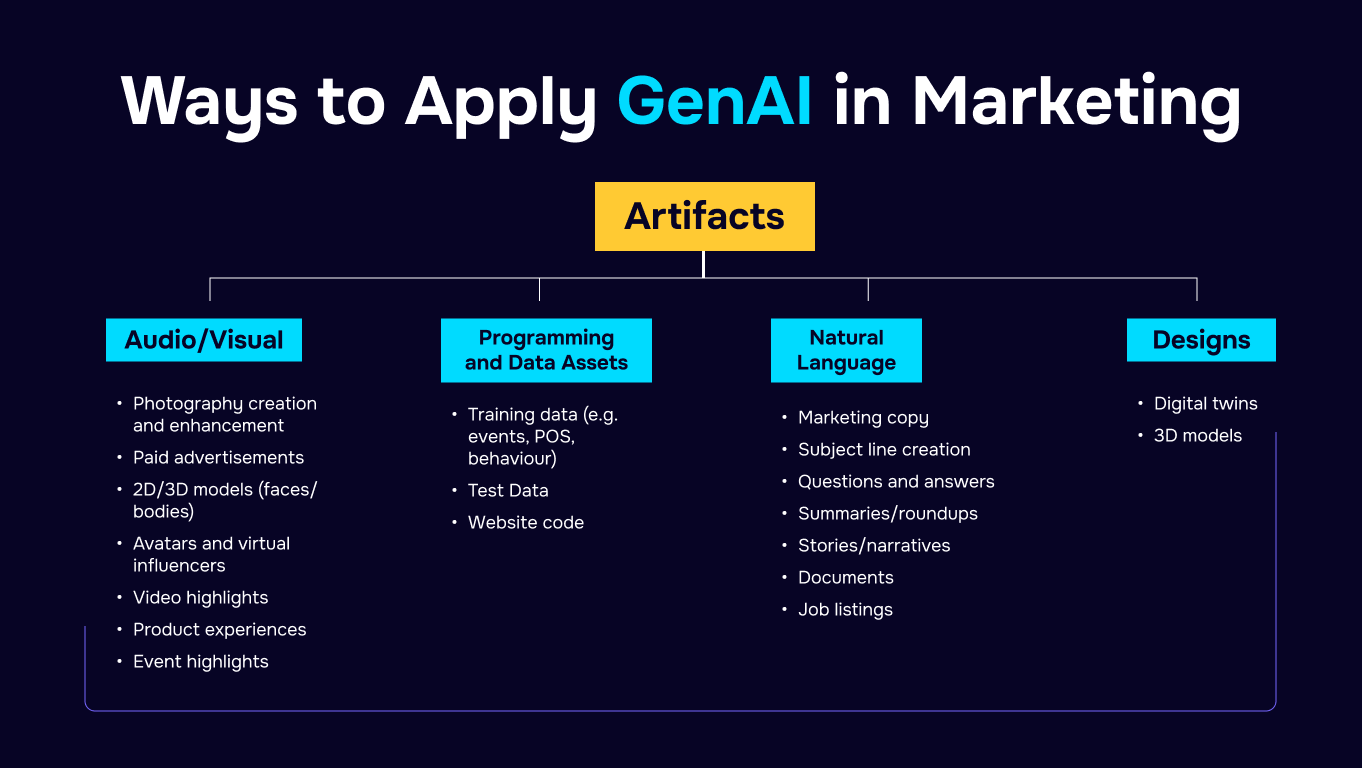
4. AI-Driven Audience Segmentation
This advanced form of segmentation uses machine learning to identify specific audience subgroups. It helps in crafting highly targeted marketing strategies that cater to specific needs and interests.
Impact on your marketing strategies:
- Targeted marketing: Leads to more relevant and impactful marketing messages.
- ROI improvement: Enhances conversion rates and investment returns.
- Dynamic segmentation: Adapts to evolving customer behaviors.
5. AI Integration with AR and VR
Combining AI with AR and VR technologies is creating immersive marketing experiences. AI can tailor AR/VR content in real-time, offering personalized product recommendations and interactive advertising campaigns.
Impact on your marketing strategies:
- Immersive experiences: Creates engaging brand interactions.
- Product visualization: Enhances customer decision-making through realistic product simulations.
- Interactive advertising: Captivates customers with engaging and interactive ads.
These trends highlight the dynamic and transformative role of AI in shaping future marketing strategies. As AI continues to evolve, it offers marketers unprecedented opportunities to innovate and connect with their audiences in meaningful ways.
Best Practices for Implementing AI in Marketing
Stepping into the AI-driven marketing realm demands not just adopting new tools but also mastering new practices. These best practices form the cornerstone of successful AI implementation in marketing, ensuring that technology enhances, rather than overshadows, the human touch. Here’s how to strike that perfect balance:
1. Cultural and Contextual Sensitivity
When deploying AI in content creation, it’s crucial to imbue it with an understanding of cultural and contextual nuances. AI might be adept at processing data, but it’s your insight into local customs, cultural sensitivities, and regional idioms that ensures the content resonates with your audience. So, always review and fine-tune AI-generated content to reflect these nuances.
2. Data-Driven Content Strategies
Leverage AI tools alongside SEO data to craft content that hits the mark. By combining AI’s efficiency with SEO insights, you can create content that not only engages your audience but also performs well in search rankings. This approach ensures that your content is both relevant and discoverable.
3. Harmonizing Human and AI Efforts
The magic happens when AI insights are blended with human expertise. While AI can process data and provide analytics at an unprecedented scale, human creativity and strategic thinking are irreplaceable. Use AI to handle data-heavy tasks and generate initial insights, but rely on your human team for final decision-making, creative input, and strategy formulation.
Adopting these practices will help you harness the full potential of AI in marketing, creating strategies that are not only technologically advanced but also deeply human and resonant with your audience.
AI Success Stories in Marketing
Among the most compelling success stories is that of Netflix, a pioneer in leveraging AI to revolutionize viewer engagement. This exploration delves into how Netflix’s innovative use of AI not only reshaped its marketing strategies but also set a new standard for personalized user experiences in the streaming industry.
Netflix Revolutionizing Viewer Engagement With AI
Success Story: Netflix, a leading content streaming service, has effectively utilized AI-driven machine learning technology to enhance user experience (UX) and tailor its services to individual users. This approach has been instrumental in Netflix’s success, leveraging AI for personalized content recommendations and optimizing streaming quality.
Key Learnings
Strategies Used:
- Personalized content recommendations: Netflix uses AI to analyze user preferences and past viewing history, offering tailored content suggestions.
- Optimization of streaming quality: AI is employed to automatically adjust streaming quality, ensuring a smooth viewing experience without buffering issues.
- Predictive analysis for operational efficiency: Netflix uses AI to predict future subscriber activity, aiding in planning technological improvements.
Outcomes achieved:
- High engagement with recommendations: Over 80% of the shows watched on Netflix are based on its AI-generated personal recommendations.
- Enhanced user experience: The personalized approach has significantly improved user satisfaction and engagement.
- Business growth: This AI-centric strategy contributes to Netflix’s position as a dominant player in the streaming industry, with the recommendation feature alone valued at approximately $1 billion per year.
Netflix’s strategic use of AI in marketing has not only improved user experience through personalized content but also enhanced operational efficiency and contributed significantly to the company’s growth and success in the highly competitive streaming market.
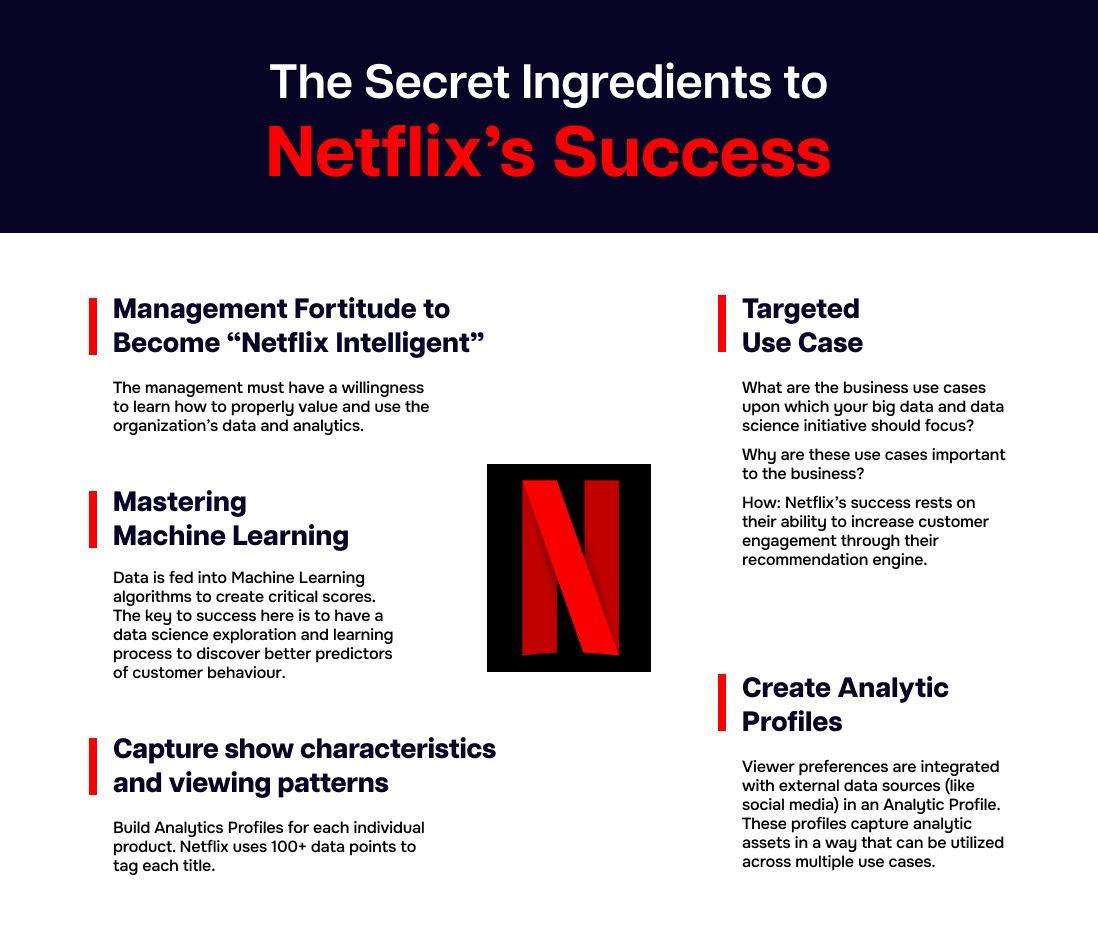
Navigating Challenges in AI Marketing
Navigating the world of AI in marketing comes with its unique challenges. Understanding these concerns and their potential impacts is crucial for implementing effective mitigation strategies. Here’s a detailed breakdown of common challenges in AI marketing and how to address them:
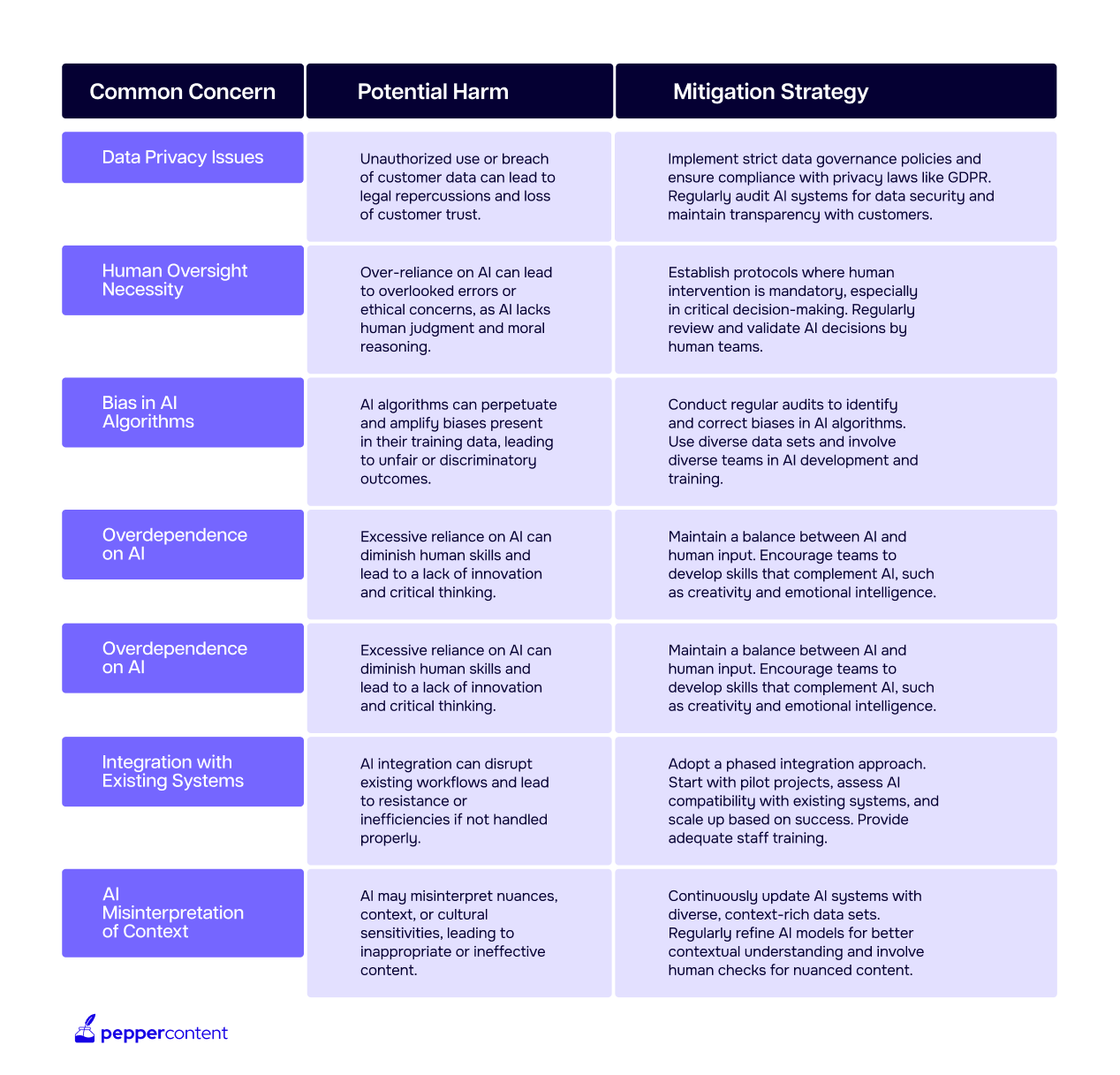
By understanding these challenges and their impacts, you can develop tailored strategies to mitigate them effectively, ensuring that your AI marketing efforts are responsible, efficient, and aligned with your business goals.
Embrace the AI Revolution: Your Next Steps
As we wrap up our journey through the AI-powered landscape of marketing in 2024, we’ve seen some pivotal insights that can reshape your marketing strategies. But it’s not just about understanding these developments; it’s about actively integrating them into your marketing playbook. Everything we discussed here in this blog is your roadmap to doing just that.
Now, the ball is in your court. It’s time to embrace AI in your marketing strategies. Dive into these AI-driven waters with a keen eye on ethical practices and a balance between technology and human touch. The future of marketing is here, and it’s AI-powered. Are you ready to be a part of this revolution?
Looking for high-quality Human+AI-led writing services? Look no further because Pepper Content is here to take care of all your content needs. Contact us today to ace your marketing game.
Latest Blogs
Explore how Google’s 2025 AI search updates triggered ranking chaos. Learn actionable strategies to adapt your SEO for AI Overviews, zero-click searches, and SERP volatility. Stay ahead now.
Learn how to rank on AI search engines like ChatGPT, Perplexity, and Gemini by optimizing your content for authority, structure, and relevance. Stay ahead in AI-driven search with this strategic guide.
Explore the best healthcare SEO services for your medical practice. Improve online visibility and effectively reach more patients in need of your services.
Get your hands on the latest news!
Similar Posts
Artificial Intelligence
3 mins read
How to Rank on ChatGPT, Perplexity, and Gemini: A Strategic Guide for Marketers

Artificial Intelligence
5 mins read
How Free AI Tools for Content Creation Can Boost Your Content Strategy

Artificial Intelligence
5 mins read